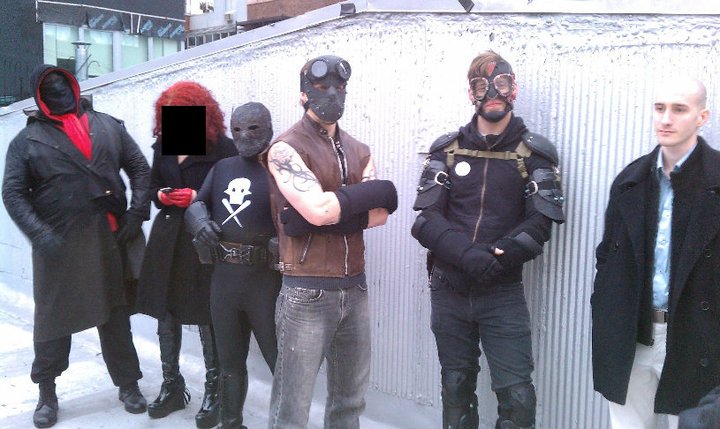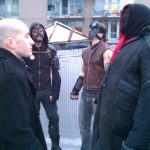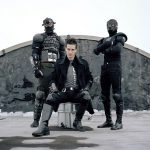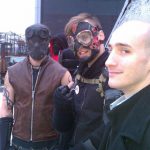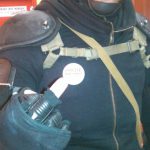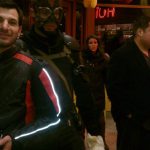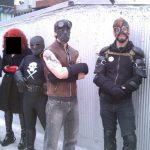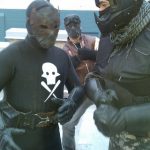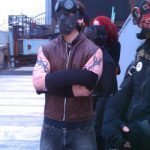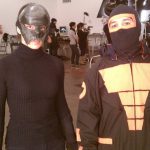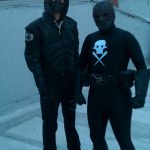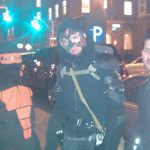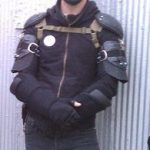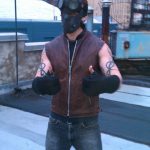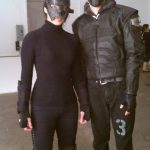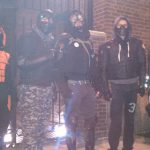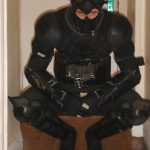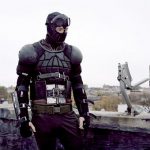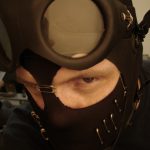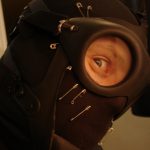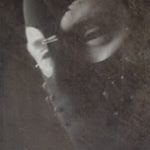You cannot see an inch of Urban Avenger’s body. He’s wearing a weird customized gas mask, green-tinted sunglasses, a red full-length hoodie, and long black leather gloves. Underneath it all he looks quite small and skinny. He says he’s in his late twenties, has children, and works “in the food-service industry.” That’s all he’ll reveal to me.He says he loves being covered from head to toe. “When I wear this, I don’t have to react to you in any way. Nobody knows what I’m thinking or feeling. It’s great. I can be in my own little world in here.”
what you mean,” I say. “I was once at a Halloween party and I didn’t take off my mask all night. It completely eliminated all social anxiety.” “Sometimes I wish I never had to take the mask off,” says Urban Avenger.
We begin our patrol through the clean, well-to-do streets of downtown San Diego. We pass bars and clubs filled with polite-looking young drinkers. A few take pictures of the superheroes on their phones. Others yell, “It isn’t Halloween anymore!” from car windows. Urban Avenger says he doesn’t understand how Phoenix is forever chancing upon crimes being committed. He’s just
.
“What are the odds?” he sighs. “I almost never see
.” He pauses. “Last October we got involved in breaking up some street fights.”
He says Phoenix is fortunate to have the scary district of Belltown on his doorstep. “Google ‘gunshots in Belltown’ and you’ll come up with a hundred stories of gunshots being fired in, like, the last
,” he says wistfully.
Some boys pass us. “Want some reefer? Ganga? Weed?” they say, sotto voce.
“No,” says Urban Avenger, walking quickly on. The boys shrug and continue on their way.
“Good thing I got all that on video,” Urban Avenger eventually calls after them, indicating a small camera attached to his shoulder.
“Crack? Heroin? PCP?” the boys call back.
“Did you really film it?” I ask.
“No,” he says.
“I noticed you didn’t attempt a citizen’s arrest,” I say.
“We didn’t have probable cause,” explains Mr. Xtreme. “All they did is
something. If they’d
“You could have said you wanted to buy some, and then they’d have produced the drugs and you could have arrested them,” I say.
There’s a short silence. “That’s true,” says Urban Avenger.
Back in Seattle, we start our second patrol at 1 a.m. on Saturday night. Phoenix is in a bad way. He’s still ailing from the key-punching and the baseball-bat incidents and has now developed a fever of 102.5.
“I found out this morning I have tetanus,” he tells me.
“You have to sleep,” I say.
“No sleeping for us,” says Phoenix.
I’m starting to like Phoenix a lot. For all his naïveté, there’s something infectiously upbeat about him. He’s forever cheerful and positive and energetic. I ask him if he’s addicted to crime fighting, and he says, “I guess you could put it in the addiction category. It’s the highlight of my day. Addictions are normally detrimental to health. This is detrimental to my health.”
He puts his positive spirit down to a stable home life: “I’ve been with my girlfriend since I was 16. I make my own money. To be a successful superhero, you’ve got to have your life in line.”
We begin in Pioneer Square. We’re a small team tonight; Pitch Black and Ghost are Phoenix’s only companions. The bars are closing, and drunk kids are piling onto the streets, but there’s still a frustrating absence of crime. But then, from somewhere up the street, we hear a shout:
“Let’s go!” yells Phoenix. He, Ghost, Pitch Black, and I start to run frantically toward the mystery commotion.”It’s the YouTube guy!” a nearby teenager shouts delightedly. “Can I get a picture?”
Phoenix screeches to a halt. “I’ll be right with you guys!” he calls to us. He poses for the girl.
“Phoenix!” I sigh.
The real-life superheroes like to portray their motives as wholly benevolent, but if they were driven purely by altruism, they’d have become police officers or firefighters or charity volunteers. Something else is evidently propelling them—a touch of narcissism. It’s an odd sort of narcissism, of course, when the narcissist disguises his face, but the lust for fame and glory is unmistakable. By the time Phoenix has had his picture taken, the potential criminal and victim are nowhere to be seen.
Two uneventful hours pass. By 3 a.m. we are losing hope. Phoenix is reduced to suggesting we rent a hotel room, phone some prostitutes, and ask them on their arrival if they need help escaping the web of prostitution.
“I think the problem with the plan,” I say, “is if a prostitute turns up at a hotel room and sees three men in masks, she’s not going to immediately think ‘superhero.’ Plus, she may have to travel all the way across Seattle. It’ll be an hour out of her night.” They agree to abandon the idea.
Suddenly we notice a man across the street drop a small, clear bag on the ground at the feet of another man.
“Yahtzee!” yells Phoenix. He rushes across the road. “What did you just drop?”
“Pretzels,” says the man, picking the bag up and showing it to us.
There’s a silence. “Good,” says Phoenix.
···Our very last hope is Belltown. When we turn the corner into the district, everything changes. By day this place is nice: art galleries, bars, restaurants. It’s just down the road from the famous Pike Place Market. But now, at 4 a.m., the two or three blocks in front of me look as menacing and desperate as the projects from The Wire. The dealers staring at us look nothing like the exhausted old crackheads from the bus stop. These are large gangs of wiry young men. They stand on every block. The police are nowhere to be seen. I take in the scene and instinctively take a small step backward.
“There’s a possibility we could get into a fight,” whispers Pitch Black. “If that happens, back off, okay?”
“What are you doing?” a man calls from across the street, outside a shuttered-up liquor store.
“Patrolling,” Phoenix calls back. “What are
you doing?”
He, Pitch Black, and Ghost walk toward him. He’s with eight other men.
“You’ve got to respect people’s block, man,” the guy is saying. “You don’t come down here with your ski masks on. What are you doing, getting yourselves entwined in people’s lives? You guys are going to get hurt. You understand? You want to see our burners?”
“I don’t care,” says Phoenix.
“You don’t care?”
“Not really. I’ve already been shot once.”
“I’ve been shot
three times!” another guy says, looking weirdly proud. “One motherfucker round here got shot in the nighttime. Innocent bystanders get shot here. Think about the bigger picture. You’re putting your lives on the line. If you guys are in a casket, your mamas are going to be like, ‘For
what?‘ ”
“Don’t be a hero,” a third man adds. “That superhero shit? You’re going to get hurt, fucking around. How you feed your family is not how we feed our family. We’re not out here for the fun and the show-and-tell. This is
real life.”
I am finding myself ostentatiously nodding at everything the crack dealers are saying, I suppose in the hope that if the shooting starts, they’ll remember my nods and make an effort to shoot around me.
“I appreciate the info,” says Phoenix.
Suddenly the first guy takes a step forward and peers at Phoenix through his mask.
“You’re a
brother?” he says. “You’re a
BROTHER and you’re out here looking like
THIS? You’ve got to be out of your fucking mind, man.”
And then it all changes. “I feel threatened right now,” the guy says. “You’ve got ski masks on. I don’t know if you’re trying to rob me. A guy got shot last Friday in Belltown by somebody with a mask on. Is that you?”
“You don’t have to be here,” says Phoenix. “You’ve got choices.”
“I’ve been in the system since I was 10 years old!” he yells. “I haven’t got no choices! When your kids get older, this is going to be the same shit.”
“I disagree,” says Phoenix.
“It can’t be better!” the man yells. “This is it!”
The dealers withdraw up the block to decide what to do next.
“Have a good night,” calls Phoenix. “Good meeting you.”
···They’re watching us, murmuring to one another. Their problem is that nobody wants to buy crack in front of three men dressed as superheroes. While Phoenix and his crew stand here, they’re losing all their business.
Phoenix points to two packs of cigarettes under the windshield wiper of a nearby car.
“Those are indications that you can buy here,” he says. “So I’m going to take them off and annoy the crap out of them.”
He scrunches the packets up and throws them onto the sidewalk.
At this, one of the gang heads toward us. If you were watching from across the road, it would seem as if he just wanders past, but in fact he whispers something as he does:
“You keep staying on our block, we gonna have to show you what the burner do.”
“Thank you, it’s great meeting you,” says Phoenix.
The man loops and rejoins the others.
The streets are deserted, and it’s starting to feel exceedingly dangerous. It’s just the dealers and their guns and us. But then, miraculously, a taxi passes. I flag it. The superheroes all have (supposedly) bulletproof vests. I have a cardigan. “I’ll give you $20 to just stay here,” I say to the driver.
He looks around. “No,” he says.
“Thirty dollars?”
And then, suddenly, the whole gang, all nine of them, some with their hands down their trousers as if they’re holding guns just under their waistlines, walk toward us. I can’t see much of Phoenix under the suit, but I can see by the way his hands are shaking that he is terrified.
“My shift is over,” calls the taxi driver. “I need to go home now.”
“Forty dollars!” I yell. “Just
stay there!”
“I don’t care about the money!” the driver yells. But he doesn’t move.
The men get closer.
“Are we leaving or are we standing?” says Phoenix.
“We’re standing,” says Ghost.
“We’re standing,” says Pitch Black.
“You’re willing to
die for this shit?” the first guy, who seems to be the leader, is yelling. “You’re willing to
DIE for this shit? You guys are dumb motherfuckers. I don’t even know what to say. You guys are
fucking stupid.” He stares at Phoenix. A moment passes. This is what I imagine a standoff feels like the instant before the shooting starts. But then his voice softens. “If you guys are going to stand here and die for it, I guess we’re going to have to walk home. We should shoot your ass, but I guess we’ve got to go home.”
And they do. They disperse. They go home.
Stunned, I look at Phoenix. He suddenly seems smaller than six feet one, lighter than 205 pounds, younger than twentysomething. “You
won!” I tell him.
“They had the weapons, the numbers, but they backed down to the image of Phoenix Jones,” he says.
I feel an impulse to celebrate with him, but suddenly the full weight of the evening comes crashing down on me.
“I’m going to bed,” I say.
“We’ll stand here for ten minutes and solidify the corner,” he replies. “You don’t want to stand with us?”
“Definitely not,” I say.
I jump into the taxi. And when I arrive back at the hotel, my legs buckle and I almost fall onto the floor.
···Five a.m. My phone rings. It’s Phoenix, shrieking with laughter, babbling, hyperventilating, releasing all the adrenaline.
“That was
ridiculously intense! In a few hours, I’ve got to be a
day-care worker!”
···It’s the next afternoon. There’s a comic convention in town, at the Washington State Convention Center in the business district. There are something like 30,000 people here, families and costumed comic fans, packing the modern glass building. I spot Knight Owl and another Seattle superhero named Skyman. He is only semicostumed. He’s unmasked and goateed, and he’s wearing a white T-shirt with a Skyman logo of his own design.
“Ooh, look, the Rocketeer!” he says at a passing costumed attendee. “You never see Rocketeer costumes! That is priceless! I gotta get me a photo of that! Ooh! Lady Riddler! Nice!”Skyman approaches a Batman. “Is that a real bulletproof outfit?” he asks him. “No,” Batman replies a little apologetically.
“This place,” I tell Knight Owl, “is full of costumed people who would never confront drug dealers in the middle of the night. You and Phoenix and Skyman exist in some shadow world between fantasy and reality.”
“Yeah,” Knight Owl replies. “What we do is hyperreality!”
And then there are cheers and gasps and applause: Phoenix Jones has arrived. He is a superstar here. He sees me and we hug—two brave warriors who have been through a great adventure together.
“Thank you for making our city safe!” a woman in the crowd calls out to him.
“You’re a very cool man!” someone else shouts.
I tell Phoenix it is time for me to leave.
“When you write this, be sure to tell everyone that what we do is dangerous,” he says.
“I think you’re great,” I say. “But I’m worried you’re going to get yourself killed.”
“Well, don’t make it seem like I’d be dying for a choice,” he replies. “I couldn’t quit if I wanted. You know how many people in this city look up to me? I haven’t paid for my own coffee in six months.”
And I suddenly realize I feel about Phoenix the same way everyone here does. I think he is an awesome superhero.
As I walk out, I hear a father whisper to his young son, “That’s a real superhero.”
“Are you a real superhero?” the little boy asks Phoenix.
Phoenix looks down at him and smiles.
“I’m as real as you can get.”
